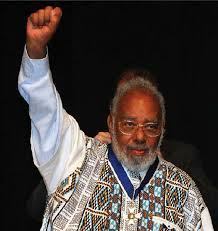|
On March 14, 1914, Abdias do Nascimento was born to parents Josina and Bem-Bem Nascimento in Franca, Sao Paulo, Brazil. As a child Nascimento experienced racism on several occasions from Italians and Brazilians who did not identify with Afro-Brazilians or lower class Brazilians. He would briefly join the Brazilian military in 1930 but was discharged for conduct undesired by the military. He began his journey as an activist joining Brazil’s first political party, the Frente Negra Brasileira. The party existed from 1931 to 1937 but was disbanded due to the dictatorial Estado Novo or the Second Republic, led by then president Getúlio Vargas. The Second Republic was an authoritarian regime suppressing any ideologies that challenged their control. Nascimento would go on to attend the Federal University of Rio de Janeiro and earned his bachelor’s degree in economics. He furthered his studies by attending and graduating from the Higher Institute of Brazilian Studies in 1957, and the Oceanography Institute in 1961. Nascimento and along with a collective of poets called the “Holy Brotherhood of the Orchid” took a trip to Buenos Aires, Argentina, there Nascimento was privileged to witness Argentinian theater being performed by the Teatro del Pueblo, who incorporated their history and culture within their performances. Inspired by the performances, Nascimento went on to create the Teatro Experimental do Negro, or the Black Experimental Theater, in 1944. Borrowing from the Teatro del Pueblo, Nascimento incorporated African culture, history and education into his performances. Further into his career he starred in a popular play titled Orpheus Of The Conception that eventually became the movie Black Orpheus. The Teatro Experimental do Negro also published a newspaper titled Quilombo after the communities created by the Africans who escaped slavery. Nascimanto’s activist spirit grew stronger and more creative as he found ways to incorporate his messages into the Teatros performances. Democracy was Nascimento’s battle cry as he and the Teatro Experimental do Negro stood up for Afro-Brazilians against racism and unequal treatment. Nascimento became the toughest critic of the Brazilian government and military for their futile attempts at creating a true democracy which included Afro-Brazilians. In 1968, Nascimento was exiled by the Brazilian military and forced to plant his roots within the Pan-African movement. Even in exile Nascimento did not relent on his criticism of Brazil’s government and military. He would become the vice president and coordinator of the Third Congress of Black Culture in the Americas. He also became a university professor during his exile, he would teach at the University at Buffalo, The State University of New York where he established the chair in African Cultures in the New World, and the Puerto Rican studies programs. He was also a professor at the Yale School of Drama, the University of Ife in Nigeria, and he was also a Professor Emeritus at SUNY-Buffalo. In the early 1980’s Nascimento would return to Brazil a very popular man whose activism was undaunted by the exile. He became an opponent of the appropriation of African culture, poor education and interracial marriages. As a member of the Democratic Labor Party he was elected to the federal Chamber of Deputies in 1983, he served on the senate from 1994 until 1999, and in 2004 he was nominated for a Nobel Peace Prize. In 2011, Nascimento died at the age of 97 leaving a legacy that other activist who followed him could learn from. He used his art to promote African history and culture, his activism was used to protect Afro-Brazilians and earn human rights, he published books such as Thoth and Afrodiaspora, wrote the play Black Mystery, published a book of poetry titled Asés of Blood and Hope: Orikis, and took a stand against the military and the government. As a man who was proud of his African origins, Nascimento understood the importance of promoting his African roots to the next generations. Mr. Abdias do Nascimento, we proudly stand on your shoulders. J.A. Ward References:
https://en.wikipedia.org/wiki/Abdias_do_Nascimento https://www.britannica.com/biography/Abdias-do-Nascimento http://www.verinhaottoni.com/abdiasdonascimento/texts/bio.html
0 Comments
Leave a Reply. |
Details
Categories
All
Click Here to join our mailing list
|
Contact Us: |
Connect With Us |
Site powered by PIT Web Design


 RSS Feed
RSS Feed



